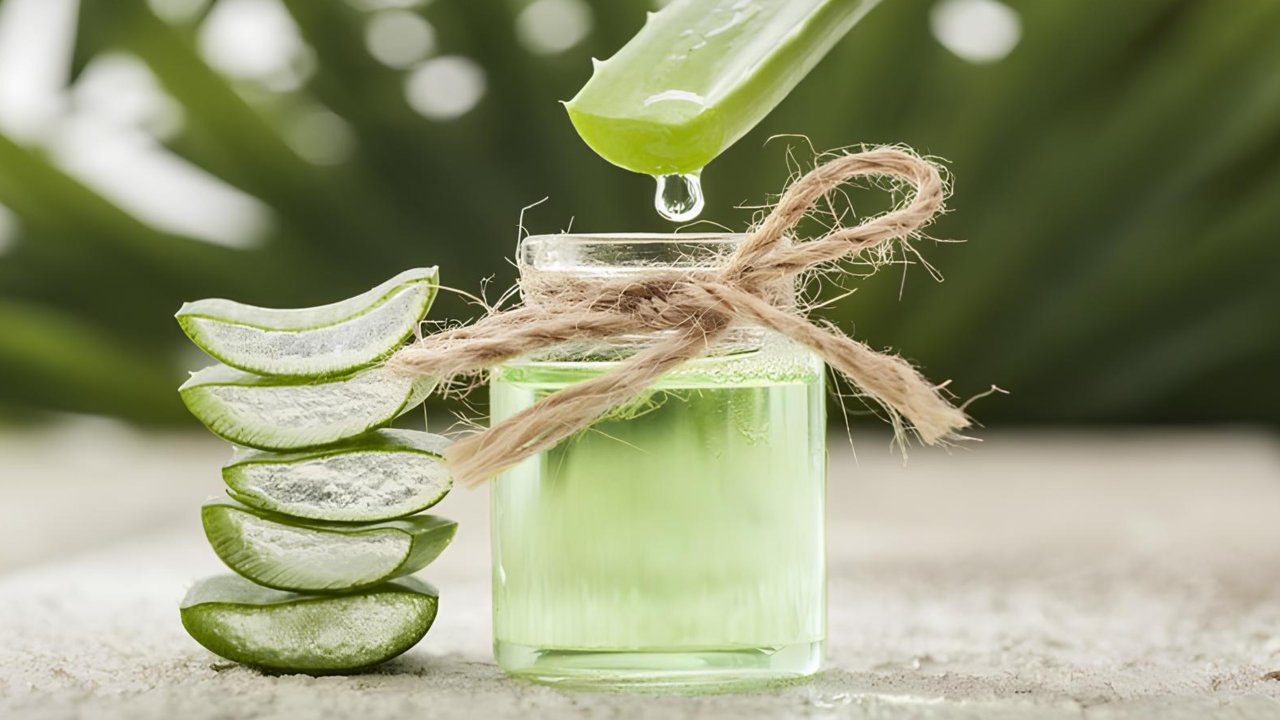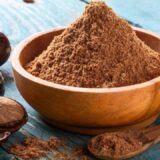Aloe Vera: Ayurvedic Benefits, Precautions, and Dosage Insights
Aloe Vera, known as Kumari in Ayurveda, is a plant revered for its numerous health benefits and therapeutic properties. In the ancient tradition of Ayurvedic medicine, Aloe Vera is celebrated for its cooling, soothing, and rejuvenating effects. It is considered a versatile herb that balances the body’s doshas, particularly Pitta and Kapha, making it a valuable remedy for a wide range of ailments.
Whether applied topically or consumed internally, Aloe Vera helps promote skin health, improve digestion, and support the immune system. Its natural ability to detoxify and cleanse the body further enhances its reputation as a powerful healing agent in Ayurveda.
Moreover, Aloe Vera is often used in various Ayurvedic formulations, including juices, gels, and herbal preparations, to harness its full potential. With a history that spans centuries, this humble plant continues to be a cornerstone of holistic health and wellness practices. Here’s an overview of its significance and historical mentions:
Overview of Aloe Vera in Ayurveda
1. Therapeutic Properties:
- Cooling and Soothing: Aloe Vera is valued for its cooling properties, which help balance Pitta dosha (the heat-related biological energy) in the body. This makes it beneficial for conditions associated with excessive heat, such as inflammation or skin irritations.
- Rejuvenating and Moisturizing: The plant’s gel is known for its hydrating and rejuvenating effects on the skin and internal organs. It is often used to support digestive health and to promote overall vitality.
- Detoxifying: Aloe Vera is considered to have detoxifying properties, helping to cleanse the body of accumulated toxins (Ama) and support overall wellness.
2. Forms and Uses:
- Topical Applications: Aloe Vera gel is frequently applied topically to soothe burns, cuts, and other skin conditions. Its moisturizing effect is also used to treat dryness and improve skin health.
- Internal Use: Aloe Vera juice or supplements are used to support digestive health, aid in detoxification, and boost immunity.
Historical Significance of Aloe Vera
1. Ancient Texts and Traditions:
- Sushruta Samhita: One of the classical Ayurvedic texts, the Sushruta Samhita, mentions Aloe Vera in the context of its applications for skin health and wound healing. It highlights the plant’s utility in treating various dermatological conditions.
- Charaka Samhita: The Charaka Samhita, another foundational text of Ayurveda, includes references to Aloe Vera’s benefits for digestive health and its role in balancing bodily humors.
2. Traditional Usage:
- Aloe Vera has been used for centuries in Ayurvedic practices for its broad range of therapeutic applications. It was traditionally applied in formulations for improving skin health, managing gastrointestinal issues, and enhancing overall vitality.
3. Cultural Significance:
- In ancient Indian culture, Aloe Vera was not only valued for its medicinal properties but also as a symbol of health and well-being. It was often included in various herbal formulations and remedies.
In summary, Aloe Vera (Kumari) holds a prominent place in Ayurvedic medicine due to its diverse health benefits and therapeutic properties.
Its historical mentions in classical texts underscore its importance and continued relevance in traditional healing practices.
Ayurvedic Properties of Aloe Vera
Aloe Vera, or Kumari in Ayurveda, is renowned for its balanced therapeutic effects on the body.
Understanding its Ayurvedic properties helps in effectively integrating it into treatments and daily routines. Here’s a detailed look at Aloe Vera’s properties in the context of Ayurveda:
Dosha-Balancing Properties
1. Pitta Dosha:
- Balancing Effect: Aloe Vera is particularly effective in balancing Pitta dosha, which is associated with heat, inflammation, and acidity. Its cooling nature helps counteract excess heat in the body, reducing conditions like inflammation, acidity, and skin irritations.
2. Kapha Dosha:
- Balancing Effect: Aloe Vera can also help balance Kapha dosha, which is linked with qualities of heaviness, coldness, and dampness. Its light, non-greasy, and slightly stimulating properties can help counteract Kapha imbalances like congestion, excess mucus, and lethargy.
3. Vata Dosha:
- Neutral Impact: While Aloe Vera is not specifically known for its effect on Vata dosha, it can still be beneficial due to its moistening and soothing properties. It can help mitigate dryness and roughness associated with Vata imbalances.
Rasa (Taste)
- Bitter (Tikta): Aloe Vera primarily has a bitter taste. Bitter flavors are known to have detoxifying and cooling effects. They help in purifying the blood and supporting liver function, which can be beneficial for conditions related to excess heat or toxins in the body.
- Slightly Sweet (Madhura): Aloe Vera also has a subtle sweet taste after digestion, contributing to its soothing and nourishing properties.
Guna (Qualities)
- Light (Laghu): Aloe Vera is considered light in nature, which aligns with its ability to reduce excess Kapha and support digestion without causing heaviness.
- Cool (Shita): Its cooling quality helps in balancing Pitta dosha by reducing inflammation and soothing irritations. This cooling property also makes it effective for conditions exacerbated by heat.
- Moistening (Snigdha): Aloe Vera has a moistening effect, which helps hydrate and soothe dry or irritated tissues. This quality supports its use in treating skin dryness and digestive dryness.
Virya (Potency)
- Cooling (Shita Virya): Aloe Vera has a cooling potency, which aligns with its ability to pacify Pitta dosha and provide relief from conditions caused by excessive heat. This cooling effect is beneficial for soothing inflammation and irritation.
Vipaka (Post-Digestive Effect)
- Sweet (Madhura Vipaka): After digestion, Aloe Vera tends to have a sweet post-digestive effect. This sweet Vipaka supports its ability to nourish and build tissues, and it also contributes to its overall soothing and balancing effects.
Top 10 Health Benefits of Aloe Vera
Aloe Vera, a succulent plant with a rich history in traditional medicine, has gained widespread recognition for its numerous health benefits. Below are some of them.
1. Promotes Skin Healing
Aloe Vera gel accelerates the healing process of minor cuts, burns, and abrasions by providing a protective layer over the damaged skin.
Its natural anti-inflammatory and antimicrobial properties help to prevent infection and reduce swelling, allowing the skin to heal more quickly.
Additionally, Aloe Vera promotes collagen production, which is essential for tissue repair and regeneration.
2. Hydrates and Moisturizes Skin
Aloe Vera is an excellent natural moisturizer that hydrates the skin without leaving a greasy residue. It contains polysaccharides that form a barrier on the skin, locking in moisture and preventing dryness.
This makes it especially beneficial for individuals with dry, flaky skin or conditions like eczema and psoriasis.
Regular application can improve skin texture and elasticity, leaving the skin soft and supple.
3. Anti-Aging Properties
Aloe Vera’s high content of antioxidants, including vitamins C and E, helps to neutralize free radicals that contribute to premature aging.
These antioxidants protect the skin from oxidative stress and damage caused by environmental factors.
Aloe Vera also stimulates the production of collagen and elastin, proteins that are crucial for maintaining skin firmness and reducing the appearance of wrinkles and fine lines.
4. Soothes Sunburns and Irritations
Aloe Vera’s natural cooling properties make it highly effective in soothing sunburns, rashes, and other skin irritations. It helps to reduce redness and inflammation while providing immediate relief from the burning sensation.
The gel’s hydration properties also help to repair the skin’s barrier, speeding up the healing process and reducing peeling associated with sunburn.
5. Supports Digestive Health
Aloe Vera juice can help soothe and calm the digestive tract, providing relief from symptoms of acid reflux, indigestion, and gastritis.
It contains natural enzymes such as amylase and lipase that assist in breaking down sugars and fats, which can improve nutrient absorption and digestive efficiency.
Additionally, Aloe Vera’s mucilaginous nature coats the digestive lining, reducing irritation and inflammation.
6. Promotes Detoxification
Aloe Vera supports the body’s natural detoxification processes by aiding in the elimination of toxins and waste products.
Its natural laxative effect can help regulate bowel movements and prevent constipation, ensuring a more efficient removal of waste from the digestive system.
Regular consumption of Aloe Vera juice can also support liver function, which plays a crucial role in detoxification.
7. Boosts Immune System
Aloe Vera is rich in vitamins, minerals, and antioxidants, including vitamins A, C, and E, which play a key role in strengthening the immune system.
These nutrients help enhance the body’s ability to fight off infections and diseases by supporting immune cell function and protecting against oxidative stress.
Aloe Vera’s polysaccharides also have immune-modulating effects, further enhancing the body’s defense mechanisms.
8. Reduces Inflammation
Aloe Vera’s potent anti-inflammatory properties can help reduce inflammation throughout the body. This makes it useful for managing inflammatory conditions such as arthritis, muscle pain, and joint inflammation.
The plant’s active compounds, including glucomannans and gibberellins, work to inhibit inflammatory pathways and alleviate discomfort by reducing swelling and promoting healing.
9. Aids in Weight Management
Aloe Vera can assist in weight management by improving digestion and boosting metabolism. Its detoxifying effects help cleanse the digestive system and enhance nutrient absorption, which can support healthy weight loss.
Aloe Vera also helps regulate blood sugar levels, which can reduce cravings and prevent overeating. Additionally, its hydrating properties contribute to a feeling of fullness and reduce unnecessary snacking.
10. Improves Hair Health
Aloe Vera is beneficial for hair care, promoting healthy hair growth and improving scalp health.
The plant’s enzymes help to unclog hair follicles and reduce dandruff, while its vitamins and minerals strengthen hair strands and prevent breakage.
Aloe Vera also has a soothing effect on the scalp, reducing itchiness and irritation, and its moisturizing properties help maintain hair hydration and shine.
Health Benefits of Aloe Vera in Ayurveda
In Ayurveda, Aloe Vera (Kumari) is esteemed for its wide range of health benefits, largely attributed to its cooling, soothing, and nourishing properties.
Here’s an overview of the various health benefits of Aloe Vera as recognized in Ayurvedic practices:
1. Skin Health
1. Wound Healing: Aloe Vera is commonly used in Ayurveda for its effective wound-healing properties. Its cooling and soothing gel accelerates the healing of cuts, burns, and abrasions. The plant’s antimicrobial and anti-inflammatory properties help prevent infection and reduce inflammation at the site of injury.
2. Moisturizing: Aloe Vera is an excellent natural moisturizer. It helps to hydrate and soften the skin, making it beneficial for treating dry skin conditions and maintaining overall skin health.
3. Anti-Aging: The antioxidant-rich gel of Aloe Vera helps combat free radicals, which contribute to skin aging. Regular application can improve skin elasticity and reduce the appearance of fine lines and wrinkles.
4. Acne Treatment: Aloe Vera’s anti-inflammatory and antimicrobial properties make it effective for treating acne. It helps to reduce redness, inflammation, and acne lesions while promoting faster healing of the skin.
2. Digestive Health
1. Soothing the Digestive Tract: Aloe Vera is known for its ability to soothe the digestive tract. It helps to alleviate symptoms of indigestion, acid reflux, and gastritis due to its cooling and anti-inflammatory properties.
2. Detoxification: Aloe Vera aids in detoxifying the body by helping to flush out toxins and impurities. This detoxifying effect supports overall digestive health and helps maintain a healthy internal environment.
3. Laxative Effect: Aloe Vera has a mild laxative effect that can help regulate bowel movements and alleviate constipation. Its mucilaginous texture promotes smooth bowel movements and aids in digestion.
3. Immunity Boosting
1. Enhancing Immune Function: Aloe Vera is rich in vitamins, minerals, and antioxidants, which help boost the immune system. Its consumption supports overall immune function and helps protect the body against infections and diseases.
4. Anti-Inflammatory Effects
1. Reducing Inflammation: Aloe Vera’s anti-inflammatory properties make it useful for reducing inflammation throughout the body. It can help manage conditions such as arthritis, muscle pain, and joint inflammation.
5. Detoxification and Weight Management
1. Supporting Detoxification: Regular consumption of Aloe Vera juice supports the body’s natural detoxification processes. It helps cleanse the digestive system and supports liver function, aiding in the elimination of waste and toxins.
2. Promoting Weight Management: Aloe Vera can assist in weight management by supporting metabolism and aiding in the detoxification of the body. Its ability to balance digestive health and boost metabolism contributes to overall weight management efforts.
6. Hair Health
1. Promoting Hair Growth: Aloe Vera is used in Ayurvedic hair care for its ability to stimulate hair growth and improve scalp health. It helps to reduce dandruff, soothe an itchy scalp, and condition the hair.
2. Strengthening Hair: The vitamins and minerals in Aloe Vera strengthen hair follicles and improve hair texture, making it less prone to breakage and damage.
7. Balancing Doshas
1. Pitta Balancing: Due to its cooling properties, Aloe Vera is particularly effective in balancing Pitta dosha, which is associated with heat and inflammation. It helps alleviate conditions related to excess heat in the body.
2. Kapha Balancing: Aloe Vera’s light and slightly stimulating qualities also help balance Kapha dosha by reducing excess mucus and congestion.
Common Ayurvedic Preparations Using Aloe Vera
Aloe Vera is a staple in Ayurvedic medicine, and various preparations are used to harness its therapeutic benefits. Here are some common Ayurvedic preparations using Aloe Vera, including their preparation, usage, and benefits:
1. Aloe Vera Juice (Kumari Saar)
Preparation:
- Extracting the Juice: To make Aloe Vera juice, start by cutting a fresh Aloe Vera leaf from the plant. Peel away the outer skin to reveal the clear gel inside. Scoop out the gel and blend it with water to make a smooth juice. Strain the mixture to remove any remaining solid particles.
- Preservation: The juice can be stored in the refrigerator for a few days. For longer shelf life, it can be preserved with natural preservatives or processed into commercial Aloe Vera juice products.
Usage:
- Dosage: Aloe Vera juice is typically consumed on an empty stomach in the morning. The usual dosage ranges from 30 to 60 ml per day, but it can vary based on individual needs and health conditions.
- Applications: It can be consumed directly or mixed with other juices or herbal teas to enhance flavor and benefits.
Benefits:
- Digestive Health: Aloe Vera juice helps soothe the digestive tract, reduce symptoms of acid reflux and gastritis, and improve overall digestion. Its natural enzymes aid in the breakdown and absorption of nutrients.
- Detoxification: It assists in detoxifying the body by flushing out toxins and supporting liver function.
- Immune Support: Rich in vitamins and antioxidants, Aloe Vera juice boosts the immune system and helps protect against infections.
2. Aloe Vera Gel
Preparation:
- Extracting the Gel: Similar to the preparation for juice, cut a fresh Aloe Vera leaf and peel off the outer skin. Scoop out the clear gel and use it directly. For longer-term use, the gel can be blended to achieve a smooth consistency and stored in an airtight container.
- Preservation: Aloe Vera gel can be refrigerated to maintain its freshness and potency. It can also be mixed with essential oils or other natural ingredients for enhanced benefits.
Usage:
- Topical Application: Apply the gel directly to the affected area of the skin. It can be used as often as needed, typically 2-3 times a day.
- Face Masks and Hair Treatments: Aloe Vera gel can be mixed with other ingredients like honey, turmeric, or yogurt to make face masks or hair treatments.
Benefits:
- Skin Health: Aloe Vera gel is highly effective for treating skin issues such as burns, cuts, sunburns, and rashes. It provides a cooling effect, reduces inflammation, and promotes faster healing.
- Moisturization: It hydrates and moisturizes the skin, making it ideal for dry or flaky skin conditions.
- Anti-Aging: Regular use can improve skin elasticity and reduce the appearance of fine lines and wrinkles.
3. Kumaryasava
Preparation:
- Traditional Formulation: Kumaryasava is a classical Ayurvedic formulation that includes Aloe Vera (Kumari) along with a blend of other herbs and spices. The preparation involves macerating these ingredients in a mixture of water and fermented jaggery or honey, which acts as a preservative and helps in the fermentation process.
- Ingredients: The formulation may include ingredients like Ashwagandha, Shatavari, and various herbs known for their therapeutic properties.
Usage:
- Dosage: The typical dosage of Kumaryasava is 10-20 ml, taken 2-3 times a day, usually after meals. It is best consumed under the guidance of a qualified Ayurvedic practitioner to ensure appropriate dosage and usage.
- Administration: It is usually taken in diluted form with water or as directed by an Ayurvedic practitioner.
Benefits:
- Digestive Health: Kumaryasava aids in improving digestion, alleviating digestive disorders, and promoting a healthy digestive system. It helps balance the digestive fire (Agni) and improves nutrient absorption.
- Reproductive Health: The formulation is traditionally used to support female reproductive health, regulating menstrual cycles, and enhancing fertility. It also helps in maintaining overall reproductive vitality.
- Overall Wellness: Kumaryasava is believed to have rejuvenating properties, supporting general health and well-being. It is used to balance the three doshas (Vata, Pitta, and Kapha) and enhance vitality.
In Ayurveda, Aloe Vera (Kumari) is valued for its wide range of health benefits, and incorporating it into daily routines can enhance overall wellness.
However, it’s essential to use it appropriately, considering seasonal factors and individual health conditions.
Here’s a comprehensive guide to incorporating Aloe Vera into your Ayurvedic diet and lifestyle, along with precautions and safe usage guidelines:
Incorporating Aloe Vera into Daily Routines for Overall Wellness
1. Daily Consumption:
- Aloe Vera Juice: Incorporate Aloe Vera juice into your morning routine for its digestive and detoxifying benefits. Consuming 30-60 ml of Aloe Vera juice on an empty stomach can support digestion, boost immunity, and aid in detoxification. You can mix it with other juices or herbal teas to enhance its taste and benefits.
- Aloe Vera Gel: Add a spoonful of Aloe Vera gel to smoothies, yogurt, or salads to leverage its hydrating and nourishing properties. This can help maintain skin hydration and support overall health.
2. Topical Applications:
- Skin Care: Use Aloe Vera gel as a daily moisturizer or as a soothing treatment for minor skin irritations. Apply it directly to the skin to benefit from its healing, anti-inflammatory, and hydrating properties.
- Hair Care: Incorporate Aloe Vera gel into your hair care routine by applying it as a conditioning treatment or adding it to your shampoo. It helps with scalp health, reduces dandruff, and promotes healthy hair growth.
3. Digestive Health:
- Digestive Aid: Aloe Vera juice can be used as a regular part of your diet to support digestive health. Its natural enzymes and soothing properties help in maintaining a healthy digestive system and improving nutrient absorption.
Seasonal Considerations for Aloe Vera Usage
1. Summer:
- Cooling Effect: Aloe Vera’s cooling properties make it especially beneficial during hot summer months. It helps soothe sunburns, reduces heat-related skin issues, and provides hydration. Consuming Aloe Vera juice can help balance Pitta dosha, which tends to increase in the summer.
2. Winter:
- Moisturization: In colder months, Aloe Vera’s hydrating properties are beneficial for combating dry, flaky skin. Its moisturizing effect helps maintain skin hydration and prevent dryness, which is common during winter.
3. Spring and Fall:
- Balance: During transitional seasons like spring and fall, Aloe Vera can help balance the doshas as the body adjusts to changing temperatures. It supports overall health and can help manage seasonal allergies and changes in skin conditions.
Precautions and Contraindications
1. Potential Side Effects:
- Digestive Issues: Excessive consumption of Aloe Vera juice can lead to digestive issues such as diarrhea or abdominal cramps. It’s important to start with a small amount and monitor your body’s response.
- Allergic Reactions: Some individuals may experience allergic reactions or skin sensitivities when using Aloe Vera topically. It’s advisable to do a patch test before using Aloe Vera gel extensively.
- Laxative Effect: Aloe Vera latex (a yellowish substance found in the outer leaf) has a strong laxative effect and should be avoided to prevent dehydration or diarrhea.
2. Who Should Avoid Aloe Vera:
- Pregnant and Nursing Women: Aloe Vera juice, especially if it contains Aloe latex, should be avoided during pregnancy and breastfeeding due to potential risks of miscarriage or gastrointestinal issues.
- Individuals with Diabetes: Aloe Vera may lower blood sugar levels, so individuals with diabetes should monitor their blood sugar levels closely and consult with a healthcare provider before use.
- People with Gastrointestinal Disorders: Those with pre-existing gastrointestinal conditions, such as Crohn’s disease or ulcerative colitis, should use Aloe Vera cautiously, as it may exacerbate symptoms.
3. Safe Usage Guidelines:
- Moderation: Use Aloe Vera in moderation to avoid potential side effects. For Aloe Vera juice, start with a small amount and gradually increase if tolerated well.
- Consultation: It’s best to consult with an Ayurvedic practitioner or healthcare provider to determine the appropriate dosage and form of Aloe Vera based on your individual health needs.
- Quality: Use high-quality Aloe Vera products that are free from contaminants and additives. For topical applications, ensure that the Aloe Vera gel is pure and derived from reputable sources.

























